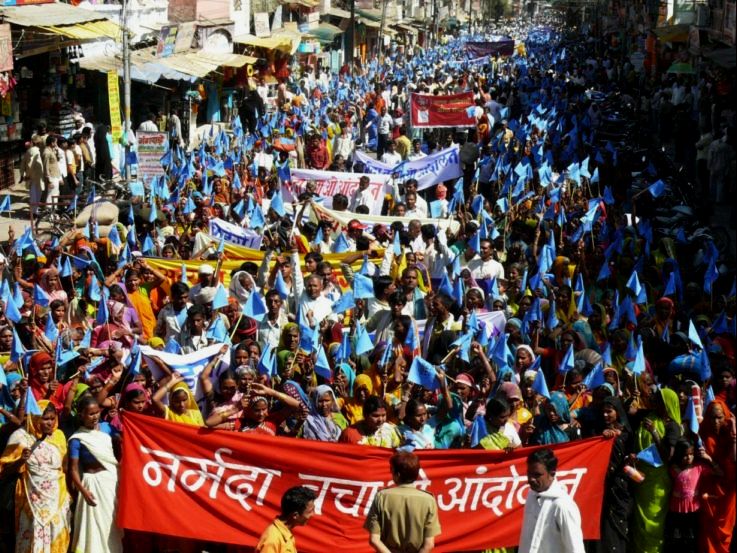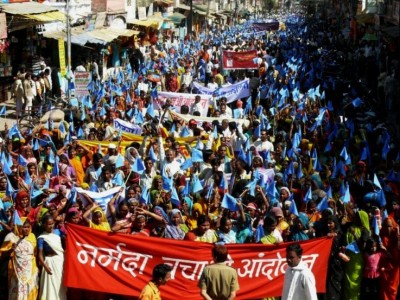In a shocking revelation, the records of the meetings held by the Ministry of Power on 26.05.2011, 15.06.2011, and 19.10.2011 obtained by the NBA under the Right to Information Act last week, expose that the cost of power from the privatized Maheshwar Hydro-electric project has now become Rs.10 per unit (Kwh). It may be pointed out that the average cost of power presently being purchased by Madhya Pradesh as per Tariff Order of the MPERC for the year 2011-2012 is Rs. 2.44 per unit. Cost of power from two upcoming private power projects in Madhya Pradesh – Essar Power and Torrent are Rs. 2.45 per unit and Rs. 3.31 per unit respectively. Cost of power from two private power projects in Himachal Pradesh – the Kancham Wangtoo and the Baspa II are Rs. 3.19 per unit and Rs. 2.61 per unit respectively. Thus the Maheshwar power is exorbitantly expensive, perhaps the most expensive power in the country, and vindicates the long term criticism of the NBA that the Maheshwar project is a completely unviable project, for whose power there will be no takers. It is also clear that the destruction of the valuable lands and livelihoods of over 10,000 families living in the 61 affected villages is without any public interest.
It may be pointed out that the records of the meetings of the Ministry of Power show that although the financial institutions are keen that the Government of Madhya Pradesh agree to purchase this expensive power and provide a letter of comfort to them in this regard, there is presently no approval by the Government of Madhya Pradesh to purchase such high cost power. Any such decision by the Government of Madhya Pradesh to purchase this expensive power would be suicidal as it would mean a completely unjustifiable additional payment of Rs. 21,000 crores of public money. [Rs. 7 per unit x 823 Million units x 35 years]
The privatized Maheshwar power project,(400MW) owned by the S. Kumars group of companies, is one of the large dams being built on the river Narmada and is slated to submerge the lands and homes of over 10,000 families in 61 villages of the area. The Maheshwar Project was initially with the State government, but was privatized in 1992 and handed over to the S. Kumars group of companies.
While addressing the press conference noted lawyer Prashant Bhushan said that the case of Maheshwar dam is a clear case of corruption. Despite the unviable nature of the project and glaring financial irregularities, the public financial institutions and banks have continuously putting public money in this unviable project. He demanded a CBI enquiry into irregular public lending by the financial institutions and banks and the financial irregularities involved in the project, and registration of cases against the responsible persons under the Prevention of Corruption Act. He also demanded that the Govt. of Madhya Pradesh scrap all its agreements including its power purchase agreement with the S. Kumar’s, and not relent to any pressure to purchase high cost Maheshwar power. He also called on the financial institutions and banks not to infuse any further public money into this high cost and unviable project.
Public funds knowingly infused into unviable project
It may be noted that IFCI Reappraisal prepared on behalf of the consortium of lenders to the Maheshwar project had noted in March 2000, that the Maheshwar project, if implemented would cost at least Rs. 2254 crores. However, in April 2000, the Central Electricity Authority disallowed this proposal and approved the Maheshwar Project as techno-economically viable only at Rs. 1673 crores. Thus, it was known to the financial institutions and banks in beginning of 2000, when only Rs. 122 crores of public money had been infused into the project, that the Maheshwar project would cost more than Rs. 1673 crores and had become techno-economically unviable. However, instead of pulling back and minimizing the damage, over the next one decade, the Indian financial institutions and banks including the Power Finance Corporation, Rural Electrification Corporation, HUDCO, SBI, Bank of India, Central Bank of India, IDBI, IFCI, Central Bank of India recklessly invested over Rs. 3000 crores into this high cost and unviable private project, violating public interest and public trust and placing public money into jeopardy.
Thus in 2005, the State Government and Central governments and financial institutions gave further public funds and sovereign guarantees to the project for the resumption of work after stoppage of all project work for five years between 2001 and 2005, even though it was known to them that the project had become completely unviable. The Re-stated and Amendatory agreement dated 16.09.2005 signed by the S. Kumars companies, the Government of Madhya Pradesh and the Power Finance Corporation under the Union Ministry of Power prior to the resumption of work candidly stated: “Given the accumulated interest on the part loans raised, the resultant tariff of the project was considered too high to ensure continued project viability.”
The work on the Maheshwar Project had stopped from 2001 to 2005, because the Madhya Pradesh State Industrial Development Corporation (MPSIDC) had seized the properties of the Maheshwar dam from the S.Kumars because the S. Kumars had willfully defaulted and refused to pay back loans taken from the MPSIDC. The work was also stopped because from March 2000, the financial institutions lending to the Maheshwar project stopped disbursement of public money into the Maheshwar Project, until 106.4 crores of project funds diverted by the S. Kumars to unrelated entities including its group companies was brought back, with interest.
Public Loans and guarantees given without heeding financial irregularities
The State and Central governments and the financial institutions were unwilling to heed any early warnings. Thus the Power Finance Corporation which earned the censure of the CAG of India in its Report for the year ending 2004, for investing Rs. 100 crores into the project in contravention of the powers of the Board, and without the prior infusion of equity by the promoters, refused to accept the early warning, and proceeded to invest Rs. 1250 crores into the project.
Similarly, although the S. Kumars resumed the properties of the Maheshwar Project by the means of a settlement with the MPSIDC in 2004, which it reneged on, after some payments, which was severely censured by the CAG in its Report for the year ending 2005, the Madhya Pradesh government turned a blind eye to the same. Further, although it was a condition of the Restated and Amendatory agreement dated 16th September 2005 that the MPSIDC loans willfully defaulted on by the S. Kumars be settled through an One-time settlement, the S. Kumars did not make any one time settlement with the MPSIDC, and instead, gave post dated cheques of Rs. 55 crores to the MPSIDC, which bounced when they were presented at the bank by the MPSIDC, because the bank accounts of the S. Kumars companies had meanwhile been closed. However although the State Government and the Power Finance Corporation had given guarantees to the Maheshwar Project on the basis of an One Time settlement with the MPSIDC, no steps were taken to cancel the guarantees, although the MPSIDC, which is a State owned corporation, filed 20 cases under S. 138 and 141 of the Negotiable Instruments Act and S.420 of the IPC against the S. Kumar’s companies, and ran from pillar to post to recover the monies.
Further, although it is RBI requirement that willful defaulters and companies facing criminal charges cannot be given any further public money and access to the capital markets, the financial institutions have provided money without any cease from 2005 onwards, little heeding that charges of cheating, criminal conspiracy, etc under S. 407, 420 467, 468. 120 B have been by filed the Economic Offences Wing of the Government of Madhya Pradesh. Similarly, although it is a RBI requirement that Directors of companies facing charges of willful default, cannot be made Directors on companies receiving public money from the financial institution, Mr. Mukul S. Kasliwal who is facing such charges is presently the Chairman of the Shree Maheshwar Hydel Power Corporation Limited. It is clear that the governments and the financial institutions have favored the S. Kumars and have given them enormous pecuniary advantage in violation of public interest, and the same warrants prosecution under the Prevention of Corruption Act.
(Courtesy: Pratirodh.com)










